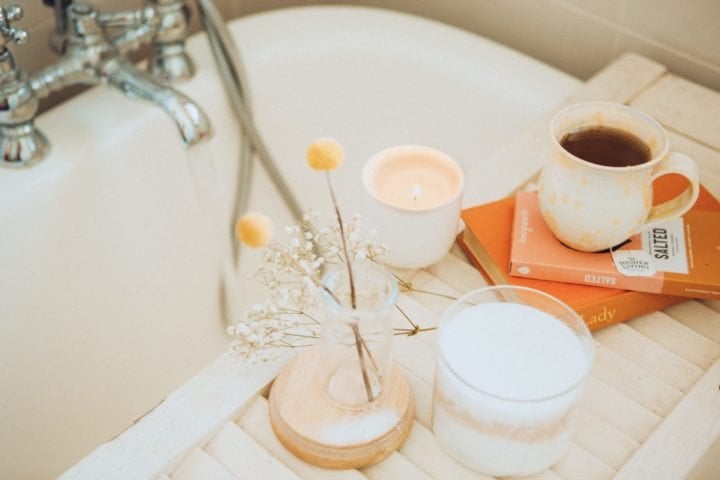How to Fall in Love with Yourself (13 Easy Tips)

What’s the most important relationship in your life? If you’re like most people, you probably said it’s with your partner, your kids, your bestie, or even a pet… but how many of us answer “ourselves”? Many of us have been taught to put ourselves last—or, at the very best, not first. Yet, if we’re honest, the person we spend the most time with is ourselves. And it’s pretty essential to be around people we actually like — and preferably, love.
So, can you learn how to fall in love with yourself? Is it really even that important? Or, is it just some touchy-feely mumbo-jumbo stuff?
The Importance of Loving Yourself
As it turns out, self-love isn’t an unnecessary indulgence. Self-love is a necessity. How you feel about yourself influences everything—from who you date to the work you do to how others perceive you to how you cope when your limits are tested. If you want quality mental health and well-being (as we all do and should), then taking time for yourself is vital.
Some of the countless benefits of self-love include:
- Being happier
- Being more optimistic
- Lowered depression
- Less anxiety
- Improved mood
- Less stress
- Stronger mental health
- Increased sense of wisdom
- Greater motivation
- Enhanced ability to take initiative and self-responsibility
- Making healthier lifestyle choices
- Becoming more curious
- Greater willingness to explore
- Being more agreeable
- Increased capacity to learn
- Being more conscientious
- Becoming more extroverted
- Enhanced connections and relationships with others
- Increased satisfaction with life
Self-Love Isn’t Narcissism
With all of the positive benefits of self-love, there’s been a healthy trend toward encouraging people to take strides to increase self-esteem. There’s a belief that to love ourselves, we have to think positively about ourselves. Yet, it’s a mistake to equate self-love with self-esteem, or worse, its overbearing and ugly cousin, narcissism. According to one for the foremost self-love (aka self-compassion) researchers Kristin Neff, self-esteem is a “global evaluation of self-worth.” It’s the judgment: “Am I a good person, or am I a bad person?”
The problem with self-esteem is not if you have it (as self-esteem can have positive effects), but rather, it’s how you get it. Within the Western culture, we’re taught that to have high self-esteem, we need to be special or “above average.” And as you probably know well, in this culture, it’s often not okay to be average. Raise your hand if you would consider being told you’re “average” an insult.
The problem with that is if we’re always trying to be above average, special, or better than others, we tend to try to find ways to puff ourselves up, which can lead to putting others down (to feel better about ourselves in comparison). Self-esteem is contingent on success, especially in areas that are important to us. So, if we don’t meet our ideals or fail to reach our goals, we then feel crappy about ourselves, and in turn, our self-esteem takes a blow.
When this is taken to extreme, good self-esteem can become narcissistic. Researchers have been tracking narcissism, and sadly, levels are currently higher than ever. And there are a lot of unexpected societal ills that can come about when we all need to feel like we’re better than others. Bullying, for example, often takes place because people are trying to feel better about themselves. They want to feel stronger and more powerful, and to do so, they hurt or diminish others. Prejudice, as an example, can have the same ugly roots (such as, that group of people is different and therefore “not as good”).
How do we get off this unsavory self-esteem path that can lead to, on one hand, narcissism, or on the other, feeling awful about ourselves? By instead delving into self-compassion. That is, learning to relate to ourselves kindly—by embracing ourselves just as we are, including our imperfections.
Self-compassion, often used interchangeably with self-love, is made up of three key components:
- Kindness: Treat yourself with compassion as you would a good friend (instead of with harsh self-judgment).
- Common humanity: Self-esteem asks, “How am I different”; self-compassion asks, “How am I the same as others?” To be human means to have flaws. None of us are perfect. That is the shared human experience, and while each of us is unique, self-compassion recognizes that everyone has challenges, makes mistakes, and feels down or inadequate at some time or another.
- Mindfulness: “Being with what is in the present moment.”
Self-compassion, in short, offers all of the benefits of self-esteem without any of the pitfalls.
Now that you know how important self-love is, how do you make it so?
Here are 13 ideas to help you start giving the time, attention, and yes, affection to the most important person in your life (YOU!):
How to Fall in Love with Yourself (13 Tips)
Falling in love with yourself starts with self-care, but it’s also essential to get to know yourself better. Do you even remember what you like to do anymore? Or, do you have so many balls in the air at once that you don’t even remember what a hobby is, much less one you might enjoy?
If not, start by taking the time to discover who you are.
1) Road Trip!
I have a good friend whose marriage ended after a decade. With her identity etched as “part of a couple,” she was understandably shaken by the ending of the long-term relationship. What did she do? Hit the road. In her case, she loaded up her pickup truck and headed to Glacier National Park in the wilds of Montana’s Rocky Mountains. She had always wanted to visit, but her ex wasn’t all that interested. She finally had her chance, and now, she describes it as one of the best experiences she has ever had.
Traveling alone can take you out of your comfort zone, but the benefits can be huge. You can choose where to go, what you want to do (no need to negotiate), and stick to your own pace with complete freedom. You can explore a new destination, find adventure, and most of all, really get in touch with who you are.
Whether it’s one day, a week, or several months, it’s a great way to fall in love with yourself and the world around you.
2) Table for One
Remember the scene in the movie Run Away Bride when the actress Julia Roberts is trying all of the different types of eggs because her character had no idea who she really was? She had spent so much time trying to convince others that she was the woman that they wanted that she never knew what she wanted.
The question now is, how do you like your eggs? Do you eat whatever everyone else is eating? Or, do you know what you prefer? If not, it’s time to try new foods, recipes, tastes, and textures to discover what truly makes you and your taste buds happy.
While you’re at it, why not make an event of it? Go all out, order your favorite dishes — or something you’ve always wanted to try — and savor every bite. Eat mindfully and connect with yourself for at least one meal.
3) Take Time Alone
One of the best ways to spend alone is in a quiet retreat. You can enjoy solo hikes, silent meditations, or just a chance to let your mind relax. Without all the competing voices around you, you might start hearing your own thoughts, reminding you of lost memories, dreams, and goals.
If a meditation retreat or lodge sounds like too much of an expense or a commitment, why not take a solo camping trip or visit a cabin by a lake? Bring some comfy clothes, a journal, and an open mind to get to know you again.
Does this idea make you uncomfortable? Does quiet time alone sound terrifying? That’s okay. Start with just a single moment. Close your eyes and take a deep breath in and let it out — all the way. Repeat for a minute, 10 minutes, or more. Right now, it’s all about you. Remember that meditation isn’t about getting rid of all your thoughts. It’s about rising above the noise and being able to sift through thoughts to find what’s most important.
4) Drop the Digital
Interruptions are a part of everyday life. And with smartphones, computers, TV screens, and social media all vying for our attention, we barely have a moment to be calm and take a look around. Plus, studies have found that the more time we spend scrolling through our feeds, the more likely we are to be depressed. All the perfectly-filtered images we see make the grass look so much greener outside of our own lives. (Remember, comparison to others leads to pitfalls, and right now, we’re focused on just ourselves.)
Take a full day—yep, sunup until sundown—to avoid looking at even a single screen. Again, if that feels like too much, start smaller. Start with one screen-free hour—perhaps while sipping on a favorite coffee beverage and reading a decadent novel. Or, maybe just looking out the window and enjoying the sunset is more to your liking. This is your time. You spend it how you want to. Just make sure it’s in real life rather than through the filter of a screen.
5) Face Your Fears
Your life is probably pretty familiar—pretty much the same from one day to the next. When was the last time you did something that took you outside of the comfort zone you’ve created for yourself?
To get to know yourself better (and encourage growth), it’s time to face some fears and try something new. Maybe it’s a new exercise program or gym or a new activity that you have a hard time admitting looks like fun (try pole dancing, aerial yoga, a bungee workout, or skydiving, for example). Go ahead and sign up for a class and give it a try. Once you’ve faced your fear, you’ll begin to realize how much more capable you are than you thought. Or, you’ll discover that rock climbing isn’t your thing, and instead, you’d rather stick to a quiet hike. Either way, you win just by spending quality time with yourself and making discoveries.
6) Soak It Up
How does a spa day for one sound to you? Too indulgent? Well, you deserve it. Choose your favorite way to warm your body and release toxins. That could be a hot sauna, a steam room, hot tub, or a cozy at-home bath. Grab a soft, fluffy robe that feels like a hug and snuggle up for some sweet self-care.
7) Flower Delivery
Think that flowers have to come from someone else? Nope. Next time you’re at the grocery store, instead of swiftly rolling your cart by the floral section, find your favorite blooms, colors, or smells and bring them home and place them anywhere you’re likely to see them throughout the day. Or, go online and have them delivered. Every time you see the beautiful colors or get a scent of the floral, you can smile knowingly about how loved you are.
Love, including self-love, is about nurturing your relationship. Take time to take care of yourself, learn something new, and enjoy being with yourself. You’ll not only benefit yourself, but you’ll be the best version of yourself for everyone else.
8) Give Yourself a Break
If you’re a hard worker—striving to do and be not just better but perfect—then you’re probably harder on yourself than anyone else is. Many of us grew up believing that perfectionism is a positive quality. We’re taught to focus on even the smallest details—and get everything right all the time. Unfortunately, according to research, perfectionists are at a higher risk of physical as well as mental illness.
Indeed, perfection isn’t just “not ideal,” it’s harmful—like smoking, being morbidly obese, or drinking too much alcohol. It should be obvious that beating up on yourself isn’t good for you. And perfectionism has been tied to irritable bowel syndrome, fibromyalgia, eating disorders, and a shorter lifespan. And if you do face an illness like heart disease or cancer, it makes it harder to recover. Plus, perfectionists are more likely to experience anxiety or depression. (Not such a respectable trait after all, huh?)
Now that you know how damaging perfectionism is, you have taken the first step to counteract it. Next up is self-love.
Start by giving yourself a break, and realize that you, just like everyone else, are imperfect. There’s no need to be so hard on yourself and expect perfection. And just as importantly, stop beating yourself up for beating yourself up. 😉
“Self-kindness entails being warm and understanding toward ourselves when we suffer, fail, or feel inadequate, rather than flagellating ourselves with self-criticism,” explains Drs. Kristin Neff and Chris Germer.
9) Speak Kindly to Yourself!
Do you ever stop to actually listen how you talk to yourself? Do you call yourself stupid when you make a mistake? Clumsy when you trip? A waste of space on a lazy day? Or, ask yourself, “What’s wrong with me?” Or, “Why do I always screw up?” Or, always blame yourself when things go wrong? Would you speak to others that way or allow others to speak to you that way? Then why do you do it toward yourself?
We say things to ourselves that we would probably never say to someone else—even if we didn’t like them. The saying, “You are your own worst enemy.” is common for a good reason. Because it’s often true.
Pay attention to how you talk to yourself and start being kinder and gentler—including in the tone you use. Actively try to make your words softer and more compassionate, rephrasing your comments as if you were a loving friend. Yes, you can be your own best friend.
10) Learn to Listen
You’re busy, right? But when was the last time you stopped and asked yourself what you need? If you’re overwhelmed, you might need a minute to meditate, go for a short walk, stroke your pet, or sip a cup of coffee or tea. But if you never even bother to ask yourself—and listen for the answer—you can continue pushing yourself right past the point of boiling and into emotional overload.
11) Nourish Yourself
Think how you eat doesn’t have anything to do with how you feel about yourself? If so, you’re sadly mistaken. The foods you consume remind you if you’re treating your body like the temple it is or like a garbage dump. Give it healthy, delicious, whole-food nutrition, and you’ll be rewarded with greater, more stable energy, better brain functioning, improved digestion, and greater self-appreciation. You are worth it! How you feed your body isn’t just about how it looks, but more importantly, how it feels.
12) Exercise with Love
I’ve met many people throughout my career who exercise because they hate the bodies they have. This always breaks my heart. Exercise should be about love—you do it because you love your body and want to take care of it. After all, there are so many amazing things that exercise does for the body, mind, and soul. If it came in a bottle, exercise would be the most effective, wide-reaching magic pill, and it would be expensive.
Unfortunately, most people go through the motions of an exercise program they really don’t enjoy—because that’s what they’ve been told they “should” do. But exercise is something to enjoy—yes, you can find real pleasure in moving your body.
If running isn’t your thing, try dancing or biking or lifting weights or Pilates or walking your dog or swimming or playing basketball or volleyball or skiing or hiking (or any combination you choose). What’s most important is that you pick an activity you enjoy so you’ll continue moving your body throughout your life. As a bonus, not only will you love yourself and your life more, you’ll also enjoy a longer health span. Plus, when you’re at peace with your body, you are more likely to have peace of mind.
13) Pamper Yourself with a Self-Love Ritual
We all have challenging days when we just want to hit the “reset” button. This is the perfect time for a self-love ritual. One example is to start by pouring yourself a favorite beverage, like a cup of hot tea or berry-, citrus-, or cucumber-infused water. Then undress and grab a bottle of your favorite body lotion. Start with your feet and massage the cream in while you thank your feet for carrying you through the day; go up your legs, continuing to massage and thanking your limbs for keeping you grounded and steady; work your way up the rest of your body, showering each body part with love and gratitude for all it’s done for you today.
The Misunderstanding of Self-Criticism
With all of the positive effects of self-love, why are we so critical of ourselves? According to the research of Dr. Neff, it’s because we believe if we’re too kind to ourselves, we won’t be motivated to improve. Instead, we think that we’ll become self-indulgent and lazy.
But the research shows just the opposite. This is because when we criticize ourselves, we tap into the body’s reptilian threat-defense system. While our physical selves are not under threat, our self-concept is. And not only do we feel attacked, we’re the attacker. This mental state of high levels of perceived stress results in the release of a lot of cortisol, which can then lead to a cascade of unhealthy effects, including depression and weight gain.
But when we’re compassionate with ourselves, research shows that we can reduce our cortisol levels while releasing feel-good hormones like oxytocin. This leads us to our optimal mindset and mental well-being to help us live our best lives.
Begin today to start loving yourself—exactly as you are. You can, and will, continue to grow and improve. But that doesn’t involve beating yourself up for your imperfections, but rather, embracing them, forgiving yourself, and learning to fall in love with the most important person in your life: you.
You are valuable—not just because you’ve reached some level of success, but rather, just because you’re you. You are a human being, and you are worthy of love.
Self-love isn’t selfish. It’s a way to open ourselves, so we are more loving and open not just to ourselves but to others. And in these chaotic times, that’s something we could all use a little bit more of. You already know how to be a kind, loving friend, don’t you? Now, do that for yourself. You won’t just improve your life; you could help improve the world around you.





 7 Signs Your Body is Seriously Low on Collagen (not just wrinkles)
7 Signs Your Body is Seriously Low on Collagen (not just wrinkles) Health Expert: "Turmeric Doesn't Work (unless...)"
Health Expert: "Turmeric Doesn't Work (unless...)" 3 Warning Signs Your Probiotic Supplement is a Total Waste
3 Warning Signs Your Probiotic Supplement is a Total Waste

